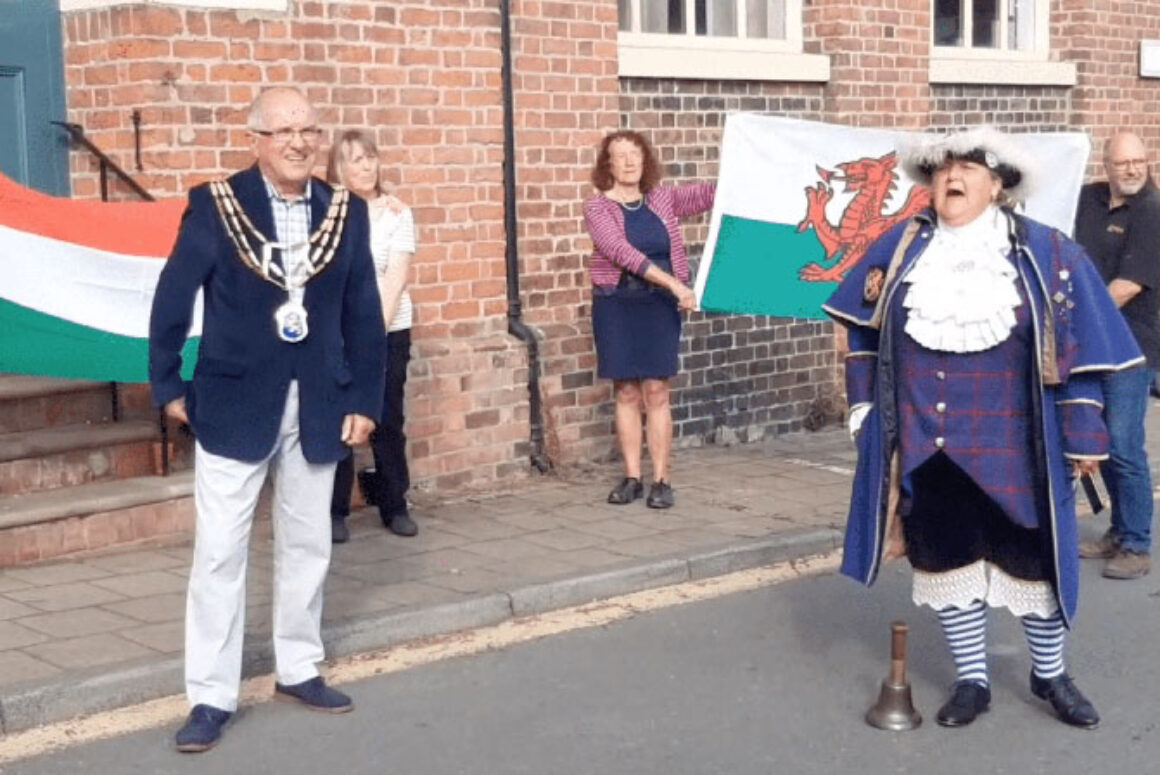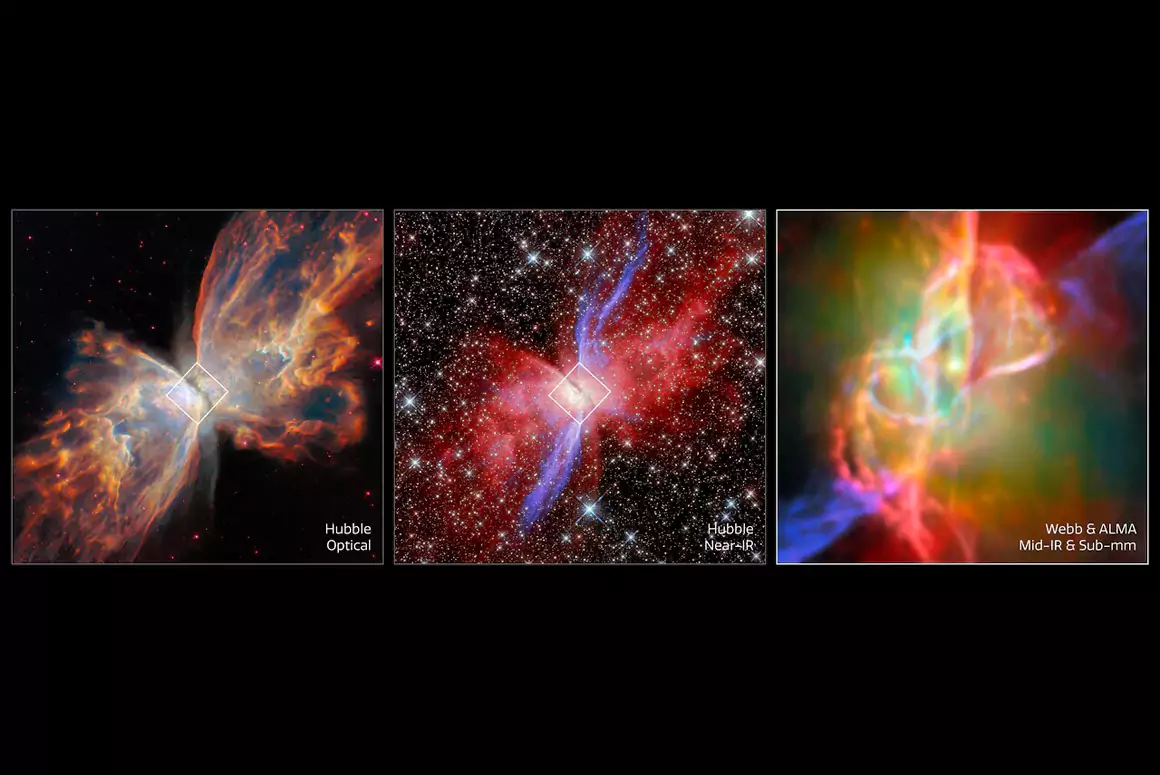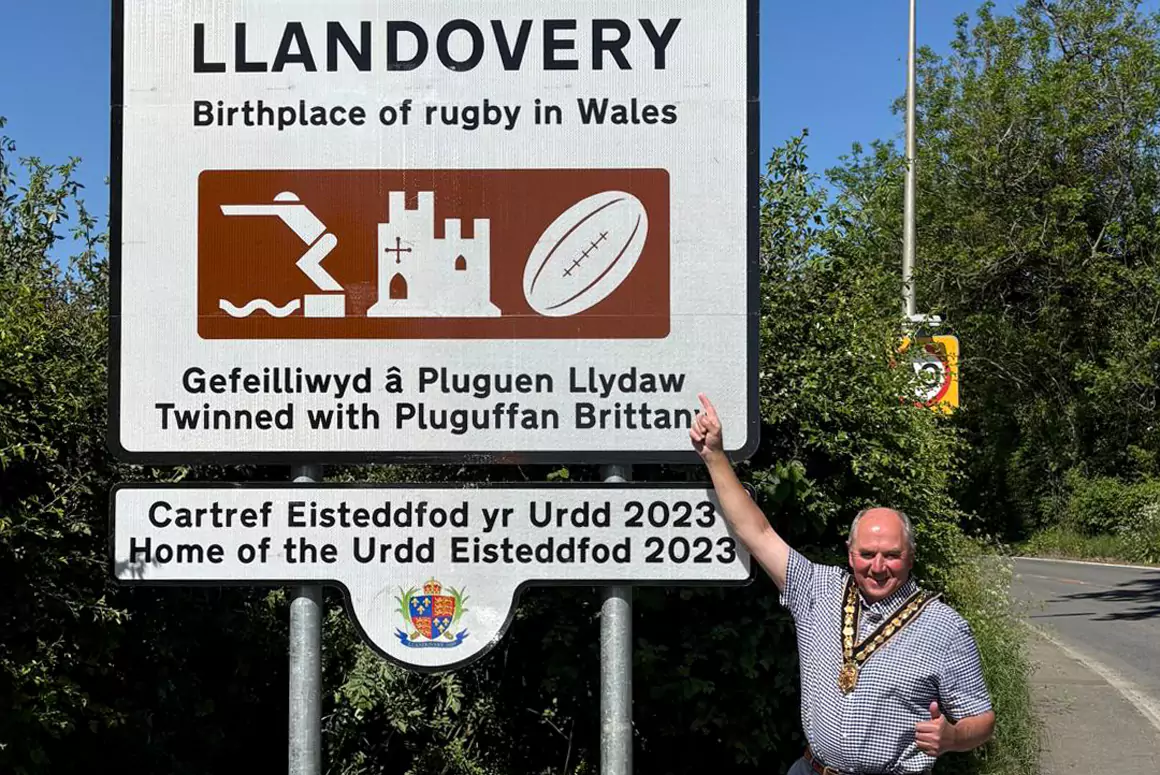![]()
- Montgomery in Powys surprised people in Hungary with a touching video message
- Festival invites and “feast of gratitude” for Montgomery as Hungarians seek to repay the gesture
- The border town is also developing close links with Hungary’s “Welshest” village
6 January 2021 – A heartfelt video message from the people of Montgomery (Trefaldwyn) has become a hit in Hungary, landing the Powys town on TV screens across the nation.
The historic town has always been proud of its literary links with Hungary, which stem from Hungarian poet János Arany’s 160-year-old ballad ‘The Bards of Wales’ – an allegorical poem set in Montgomery Castle which most Hungarian children must learn at school.
The video, produced by members of Montgomery Town Council – including the Mayor himself – has attracted over 50,000 views across social media within weeks, and has been the subject of national television and radio programmes in Hungary.
Alongside leading national outlets Index, Mandiner and Startlap spreading the word, millions could hear about and watch Montgomery’s touching gesture on national television channel M5, as well as on leading national radio Kossuth Rádió.
The short film comes in response to a video by Welsh-Hungarian cultural initiative Magyar Cymru, in which over 30 Hungarians from all walks of life came together to send a powerful ‘love letter’ to Wales with a simple message at its core: “Let’s build bridges!”
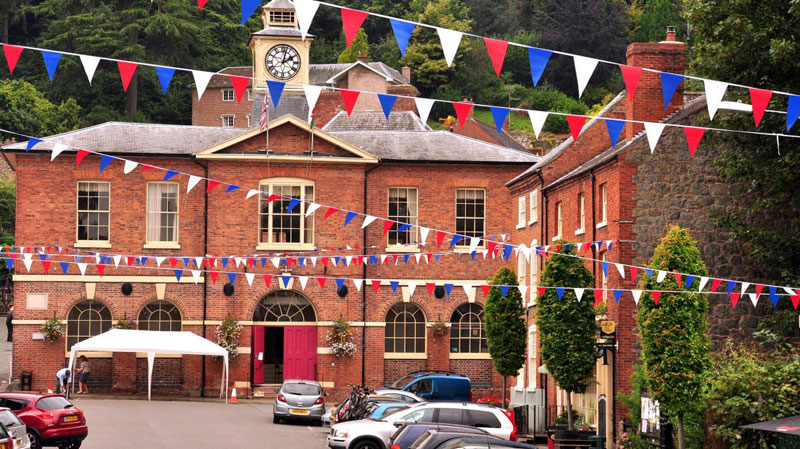
Jill Kibble, member of Montgomery Town Council, said:
“We’re overwhelmed by the response to our short film and are touched by all the messages we have received from Hungarians. Montgomery has an intriguing connection with Hungary, and it’s wonderful to know that many generations of Hungarians have learnt the name of our little town at school.
“When we found out about Magyar Cymru’s delightful video message to Wales over the summer, we knew we had to respond. So, despite the challenging times, our video project was conceived, to share our beautiful little town of Montgomery with the people of Hungary.”
Magyar Cymru founder Balint Brunner, who coordinated the original video message from Hungarians which inspired Montgomery to respond, added:
“Thanks to this famous ballad, Montgomery is perhaps better known in Hungary than Cardiff or any other Welsh city. However, we were very surprised and delighted to learn just how much locals value their links to far-away Hungary.”
“Montgomery’s video has become a hit in Budapest and beyond, as mainstream media reported on the beautiful gesture. We’ve also received enquiries from various folklore festivals and enthusiasts of the Welsh culture who wanted to help us build further ‘bridges’ between the town and Hungary.”
Among those expressing their gratitude was Aberystwyth’s Hungarian gourmet restaurant Paprika, which offered to treat Montgomery’s residents to a generous “feast of gratitude” with Hungarian specialities for around fifty people set to be delivered to the Powys town.
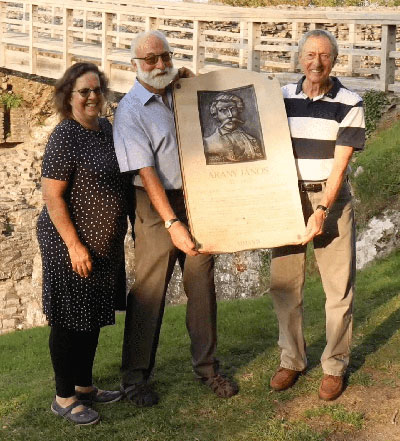
Other plans to bring Hungarian culture to Montgomery, once COVID-19 restrictions ease, include a “Hungarian Day” with young musicians from the Kodály Violin School in Carmarthenshire, and the unveiling of a permanent plaque to honour the poet János Arany – who was posthumously recognised as a “Freeman of Montgomery” in 2017.
The video from Montgomery has been particularly well-received in the village of Kunágota in southeast Hungary – branded the country’s “Welshest” village due to their tradition of hosting Welsh-Hungarian concerts.
In a bid to connect with the village in the run-up to Christmas, Haydn Andrew, Mayor of Montgomery, sent his seasonal greetings and a copy of the town’s seminal ‘Story of Montgomery’ book by Ann and John Welton to Kunágota.
Mayor Andrew’s letter to Kunágota Mayor Zoltán Pápai comes shortly after Magyar Cymru published a video from the village, in which members of the local council wished a merry Christmas to their Welsh friends in Welsh, English and Hungarian.
Meanwhile, Kunágota-born classical singer Elizabeth Sillo, organiser of the annual Welsh-Hungarian Concert in Cardiff, has extended her invitation to performers and council members from Montgomery to visit the village in the future – which, despite its status, is nearly twice the size of the Welsh town.
Montgomery’s 10-minute-long video response, which continues to attract Hungarian viewers online, featured pupils from the local Montgomery Church in Wales Primary School, current and previous mayors, and local business owners who all greeted the nation – some with song, while others learned some Hungarian for the occasion.
They were inspired to record the clips during the pandemic after watching Magyar Cymru’s trilingual ‘love letter’ to Wales, which featured children from Kunágota, opera and folk singers, educators, as well as Hungarians from Cardiff to Caernarfon who embrace the Welsh language and culture with pride.
About Magyar Cymru
Magyar Cymru is a volunteer-led cultural initiative aiming to build bridges between the Welsh and Hungarian cultures. Recent projects have been featured on the likes of BBC News, S4C, WalesOnline and news outlets across Hungary.
Launched in 2019 by editor Balint Brunner, Magyar Cymru also serves as a hub for Welsh-Hungarian news, events and stories.
Follow Magyar Cymru on Facebook and Twitter (@MagyarCymru), or visit the Magyar Cymru website.
About ‘The Bards of Wales’ by János Arany
The Bards of Wales (Hungarian: A walesi bárdok) is a ballad by the Hungarian poet János Arany, written in 1857, which tells of the fate of 500 Welsh bards executed by Edward I for not singing his praises at a banquet held in Montgomery Castle.
Arany wrote the verses after refusing to write a poem celebrating the Emperor of Austria Franz Joseph following a failed revolution in 1848 against the empire. The poem was intended to criticise the tight Habsburg rule over Hungary, disguised as a story about Edward’s visit to Montgomery in order to bypass Austrian censors.
- All Hungarian students in the sixth grade of elementary school learn “The Bards of Wales” by heart, in view of its literary importance and historical message
- In 2007, an English copy of this poem, translated by Peter Zollman, was donated to the National Library of Wales in Aberystwyth
- World-renowned Welsh composer Sir Karl Jenkins wrote a cantata to the Zollman translation of the poem in 2011
- The news about the existence of “A walesi bárdok” prompted the then Mayor of Montgomery, Eric Fairbrother, to posthumously recognise the poet as a “Freeman of Montgomery” in 2017
- The same year, an interactive animation of the legendary tale was projected onto the façade of St. John’s Church in Cardiff for all to enjoy.
About Montgomery, Wales
Montgomery (Welsh: Trefaldwyn) is a town of nearly 1,300 people is situated in the Welsh Marches (the lands along the English and Welsh border), administratively in the Welsh county of Powys. It is the traditional county town of the historic county of Montgomeryshire to which it gives its name.
Iron Age Celts, the Romans, the Saxons, the Normans, the English Civil War and many other historical forces all left their mark here. With its medieval street layout, imposing Town Hall, mix of Georgian, Victorian and timber framed buildings and an active and generous community, it’s a place where time seems to stand still.
About Kunágota, Hungary
Kunágota is a village in Békés County, in the Southern Great Plain region of southeast Hungary, with a population of around 2,500 residents.
It is renowned for its Welsh-Hungarian concert series, which regularly welcomes Hungarian artists from across the country to perform traditional songs from both cultures, in Hungarian and Welsh. The idyllic settlement has a strong connection to Welsh music and traditions, despite the fact that none of the residents have ever visited Wales.
Feature image: Montgomery’s town crier, Sue Blower, welcomes Hungarians in Hungarian, alongside Mayor Haydn Andrew (left), Jill Kibble (centre) and members of Montgomery Town Council.


